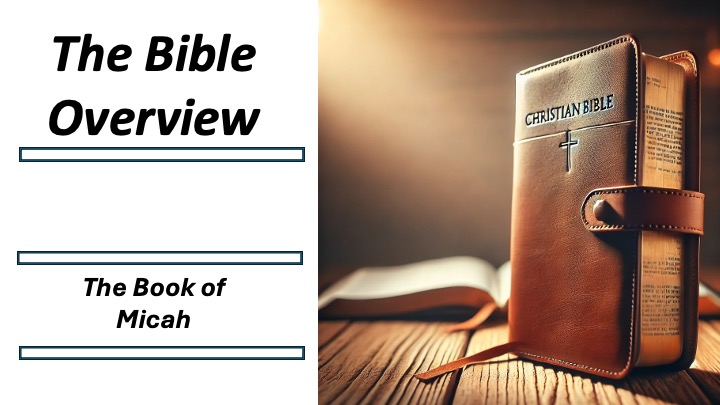Bible Overview Micah
Mike Ervin

MICAH STUDY OVERVIEW
1. AUTHORSHIP AND DATE
Traditional View:
• Micah is attributed to Micah of Moresheth, a prophet from a rural town in
Judah (Micah 1:1).
• He prophesied during the reigns of Jotham, Ahaz, and Hezekiah (circa 750–700
BCE).
• His messages primarily addressed Judah, though he also warned Israel
(Northern Kingdom) before its fall in 722 BCE.
Modern Scholarly View:
• Many scholars agree Micah was a historical prophet, but some suggest the book
was composed in stages.
• Some sections (especially Micah 4–5, which speak of future restoration) may
reflect later additions from the post-exilic period.
• Final compilation likely occurred during the exilic or post-exilic period
(6th–5th century BCE).
2. INTENDED AUDIENCE
• Primarily addressed to Judah but also includes messages for Israel and
surrounding nations.
• Calls out corrupt leaders, false prophets, and social injustice, warning of
coming judgment.
• Offers hope of restoration for a faithful remnant.
3. MAJOR THEMES
1. Divine Judgment – God’s justice against corruption, oppression, and
idolatry.
2. Social Justice – Strong condemnation of exploitation of the poor and calls
for ethical living.
3. The Remnant and Restoration – Despite judgment, God promises to restore a
faithful people.
4. The Coming Messiah – Prophecy of a ruler from Bethlehem (Micah 5:2).
5. True Worship – Emphasis on justice, mercy, and humility over ritual
sacrifices (Micah 6:8).
4. SEQUENTIAL CHAPTER REVIEW
I. Judgment Against Israel and Judah (Ch. 1–3)
• Ch. 1: Coming judgment on Samaria and Jerusalem.
• Ch. 2: Condemnation of oppressors who exploit the poor.
• Ch. 3: Corrupt leaders and false prophets condemned.
Key Takeaway: God’s judgment falls on both rulers and people for injustice.
II. Hope and Restoration (Ch. 4–5)
• Ch. 4: Future peace and restoration of Zion.
• Ch. 5: The Messianic prophecy (a ruler from Bethlehem).
Key Takeaway: Despite judgment, God’s plan includes a future hope.
III. God’s Lawsuit and Call to True Worship (Ch. 6–7)
• Ch. 6: The famous Micah 6:8 (“do justice, love mercy, walk humbly with God”).
• Ch. 7: Hope in God’s forgiveness and faithfulness.
Key Takeaway: True worship is about righteous living, not empty rituals.
CONCLUSION
• Micah balances judgment and hope, calling for justice, humility, and
faithfulness.
• His Messianic prophecy (Micah 5:2) is significant in Christian theology.
• The book remains a powerful call for social justice and true devotion to God.